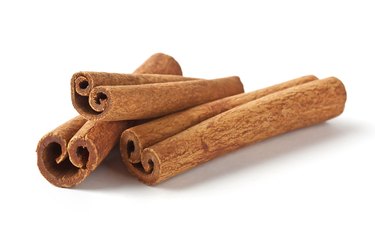
In 2010, approximately 1.9 million people age 20 and older were diagnosed with diabetes, according to the National Diabetes Information Clearinghouse. If you have chronically high blood sugar levels, you may be able to regulate your sugar levels by taking cinnamon. In traditional Chinese medicine, bark from the Cinnamomum zeylanicum tree is used to control blood sugar and high cholesterol levels and may also relieve digestive problems or improve your appetite. Additional clinical research in humans is needed, however, to substantiate these purported health effects of cinnamon.
Warning
Video of the Day
The amount of cinnamon you need to take to control your diabetes may vary depending on your age, weight and health status. Only a doctor familiar with your medical history can recommend the appropriate dosage for you. Thus, consult your medical provider before you begin taking cinnamon supplements for diabetes.
Video of the Day
Available Preparations
Available over-the-counter, cinnamon supplements come in a variety of forms, including powder, volatile oil and tincture. You can also prepare a flavorful cinnamon tea by mixing 1/2 tsp. of cinnamon powder with boiling water for 10 to 15 minutes. Cinnamon volatile oil is much more concentrated than cinnamon powder and may cause temporary oral or skin irritation or burning.
Recommended Dosage
Daily treatment with 1 g to 6 g of cinnamon powder may improve the way your body uses sugar if you have type 2 diabetes, the University of Michigan Health System reports. Your doctor may adjust your daily dosage of cinnamon to meet your blood sugar regulation needs.
Medication Interactions and Side Effects
If you're already taking a medication to help control your blood sugar levels, you shouldn't use cinnamon supplements without talking with your doctor. Combining these treatments may cause your blood sugar to drop severely, causing dizziness, blurred vision, fatigue, hunger, shaking or excessive sweating. Your doctor may need to reduce the amount of diabetes medication you are taking to counteract the effects of cinnamon. People who are sensitive to cinnamon may develop a skin rash or breathing problems after taking cinnamon. Otherwise, cinnamon is usually well tolerated when used appropriately.